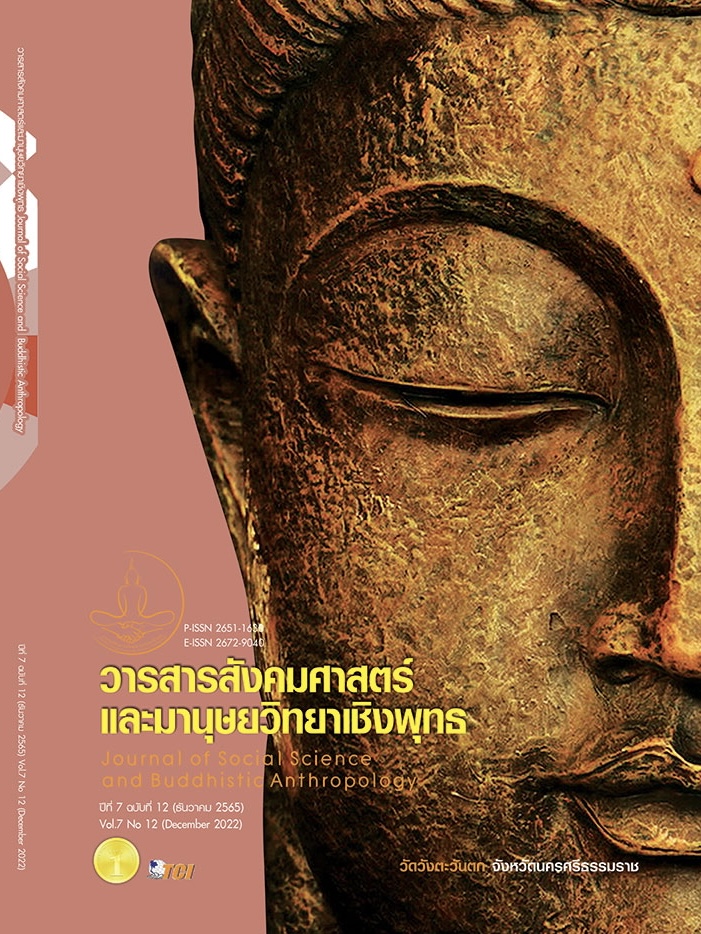PROJECT EVALUATION TO DEVELOP MATHEMATICAL SKILLS OF MATHAYOM 2 THOENG WITTAYAKHOM SCHOOL, SECONDARY EDUCATION AREA 36, CHIANG RAI PROVINCE
Keywords:
Project Evaluation, Development of Mathematical Process Skills, Zip Model EvaluationAbstract
This project evaluation report aims to develop mathematical process skills. It is an evaluation research using the CIPP model, which is assessed in four aspects: context, inputs, and inputs. Process and productivity by using the project assessment as a tool to collect data. Processed using a computer program packaged SPSS (Statistics Package for Social Sciences). The population is the school director. Deputy Director of the School Board of Education Head of Mathematics Group Teachers of mathematics subject group, parents, and Mathayom 2 in Thoeng Wittayakhom School Secondary Education Service Area Office 36, in academic year 2020, 907 people. The results of the Mathematical Process Skills Development Project of Mathayom 2, When considering the overall average of all aspects, it was found that at a high level. When considering each aspect, found that the results of the contextual assessment of process inputs The overall productivity is at a high level. higher than the specified threshold Average of each aspect, context, principles and rationale, objectives and goals of the project to develop mathematical skills of Mathayom 2, Thoeng Wittayakhom School Secondary Education Service Area Office 36, is consistent with the policy Vision and goals of Thoeng Wittayakom School Secondary Education Service Area Office 36, at a high level As for the inputs, it was found that the overall suitability and adequacy were at a high level. The highest average was on the personnel side. At the highest level, the implementation process was found to be practical and realistic at the highest level. The highest average is the highest level planning aspect. and the productivity of the project, the success and the performance of the outcomes were at the highest level.
References
กนกอร ศิลปะวิโรจน์. (2557). การประเมินโครงการเตรียมความพร้อมของนักเรียนเพื่อสอบเข้าศึกษาต่อมหาวิทยาลัยของรัฐ โรงเรียนเทพบดินทร์วิทยาเชียงใหม่. ใน ดุษฎีนิพนธ์ครุศาสตรมหาบัณฑิต สาขาวิชาหลักสูตรและการสอน. มหาวิทยาลัยเชียงใหม่.
กระทรวงศึกษาธิการ. (2551). หลักสูตรแกนกลางการศึกษาขั้นพื้นฐาน พุทธศักราช 2551. กรุงเทพมหานคร: ชุมนุมสหกรณ์การเกษตรแห่งประเทศไทย.
กฤษณะ อุ่นทะโคตร. (2562). ปัจจัยแห่งความสำเร็จและสุนทรียทักษะผู้นำที่มีผลต่อการประเมินโครงการของผู้อำนวยการโรงพยาบาลส่งเสริมสุขภาพตำบล จังหวัดกาฬสินธุ์. วารสารวิจัยคณะสาธารณสุขศาสตร์ มหาวิทยาลัยขอนแก่น, 12(2), 1-10.
ตติมา ทิพย์จินดาชัยกุล. (2557). ผลของการจัดกิจกรรมการเรียนรู้โดยใช้วิธีการแบบเปิด (Open Approach) ที่มีต่อความสามารถในการแก้ปัญหาและความสามารถในการให้เหตุผลทางคณิตศาสตร์ เรื่อง ทักษะกระบวนการทางคณิตศาสตร์ ของนักเรียนชั้นมัธยมศึกษาปีที่ 3. ใน ดุษฎีนิพนธ์การศึกษามหาบัณฑิต สาขาวิชาหลักสูตรและการสอน. มหาวิทยาลัยศรีนครินทรวิโรฒ.
ทิศนา แขมมณี. (2556). ศาสตร์การสอน : องค์ความรู้เพื่อการจัดกระบวนการเรียนรู้ที่มีประสิทธิภาพ. (พิมพ์ครั้งที่ 17). กรุงเทพมหานคร: จุฬาลงกรณ์มหาวิทยาลัย.
นงลักษณ์ ชาวแพะ. (2556). การจัดกิจกรรมการเรียนรู้ตามรูปแบบซิปปา กลุ่มสาระการเรียนรู้คณิตศาสตร์ เรื่อง สมการและการแก้สมการ ของนักเรียน ชั้นประถมศึกษาปีที่ 6 โรงเรียนอนุบาลภูซาง (บ้านดอนตัน) สํานักงานเขตพื้นที่การศึกษาประถมศึกษาพะเยา เขต 2. ใน ดุษฎีนิพนธ์ครุศาสตรมหาบัณฑิต สาขาวิชาหลักสูตรและการสอน. มหาวิทยาลัยราชภัฏเชียงราย.
นฤมล ศักดิ์ปกรณ์กานต์. (2559). ทักษะและกระบวนการทางคณิตศาสตร์. บุรีรัมย์: มหาวิทยาลัยราชภัฏบุรีรัมย์.
พิชิต ฤทธิ์จรูญ. (2557). เทคนิคการประเมินโครงการ. กรุงเทพมหานคร: เฮ้าส์ ออฟ เคอร์มิสท์.
วิมลรัตน์ สุนทรโรจน์. (2549). นวัตกรรมเพื่อการเรียนรู้. มหาสารคาม: มหาวิทยาลัยมหาสารคาม.
อเนก จินดาขัด. (2562). การประเมินผลโครงการพัฒนาและเสริมสร้างศักยภาพคนไทยกลุ่มวัยผู้สูงอายุในตำบลต้นแบบดูแลผู้สูงอายุระยะยาว จังหวัดแพร่. ใน ดุษฎีนิพนธ์วิทยาศาสตรมหาบัณฑิต สาขาวิชาการจัดการสุขภาพ ความปลอดภัย และอนามัยสิ่งแวดล้อม. มหาวิทยาลัยธรรมศาสตร์.
Rovinelli, R. J. & Hambleton, R. K. (1976). On the Use of Content Specialists in the Assessment of Criterion-Referenced Test Item Validity. Tijdschrift voor Onderwijs research, 2(2), 49-60.
Downloads
Published
How to Cite
Issue
Section
License
Copyright (c) 2022 Journal of Social Science and Buddhistic Anthropology

This work is licensed under a Creative Commons Attribution-NonCommercial-NoDerivatives 4.0 International License.









